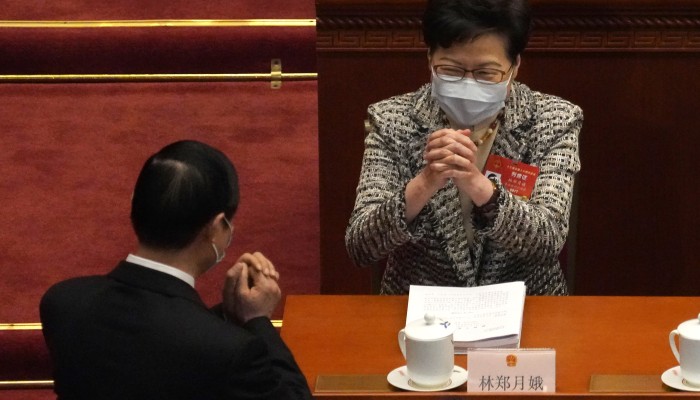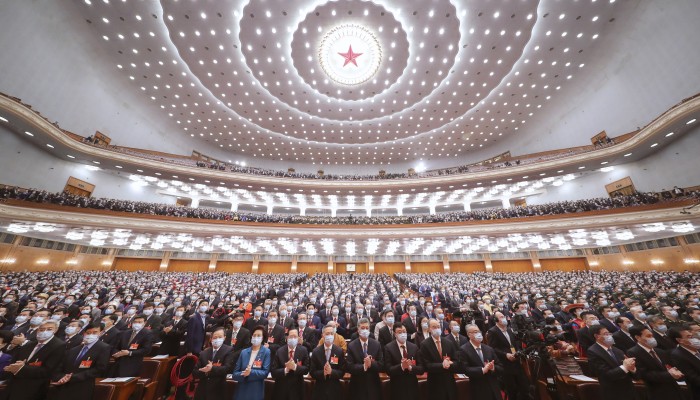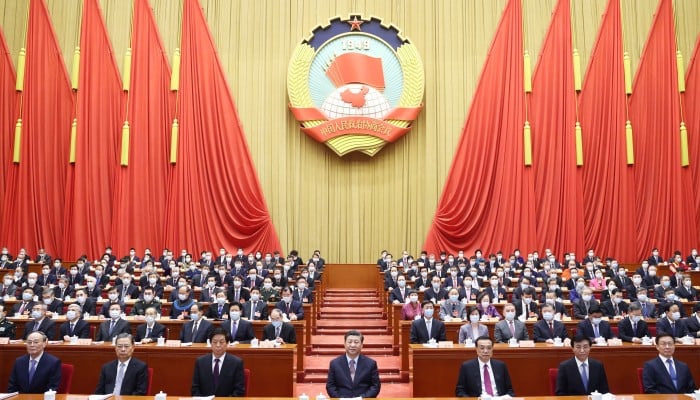Hello again,
Chinese President Xi Jinping abandoned years ago paramount leader Deng Xiaoping’s advice to “hide your strength and bide your time” and has taken a far more assertive approach to domestic politics and international relations. At last week’s “two sessions” meetings, Xi and the Communist Party leadership unveiled more details of their blueprint to push Chinese development to the next stage. We will all be watching to see how the plan unfolds.
All the best,
John Carter
Senior Editor, Political EconomyChina laid out a new policy blueprint for coming years. Now it has to implement it.
The annual meeting of the National People’s Congress (NPC) and the Chinese People’s Political Consultative Conference (CPPCC) - the so-called two sessions - are the most important political meeting of the year, when policies for the coming year are refined and locked into place.
This year’s meetings were particularly important because they introduced the new five-year plan for 2021-25 and longer term vision for 2035, and put in place the first policies to meet the goals of those two plans. In addition, Chinese Communist Party officials used the occasion to trumpet the nation’s rise ahead of the party’s 100th anniversary in July this year.
The meetings started with Premier Li Keqiang reading the annual work report, which describes the government’s activities in the past year and its plans for the coming year. Here is our special newsletter on some of the key takeaways from that report.
On the last day of the week-long meetings, Li spent most of his time in his traditional press conference pledging further job creation and improvements in living standards ahead of the Communist Party’s 100th anniversary in July. He said he hoped US and Chinese officials would find some “common ground” in their talks in Alaska next week even if major disagreements remain, though US officials warned Beijing to brace for difficult discussions. Li also said Beijing was willing to talk to Taiwanese officials as long as they accepted there is one China.
On Thursday, the NPC took its most controversial action, passing an election reform plan for Hong Kong that would ensure that “only patriots” could run the city government and establish “democracy with Hong Kong characteristics”. A Beijing official claimed there were patriots among Hong Kong opposition members. Amid criticism of Beijing’s move by the US and European Union, Hong Kong’s top official warned foreign governments not to meddle in China’s internal affairs. Beijing will use “legal combination punches” in overhauling Hong Kong’s legal system and is prepared to accept the pain to “fix” Hong Kong. Vice-Premier Han Zheng said the reform was not aimed at eliminating opposition voices. The new slate of Beijing-backed Hong Kong leaders are under pressure to tackle the city’s housing crisis, a key cause of last year’s anti-government protests. And a sharp debate has started whether the electoral changes allow any chance for democracy in the future.
On the economic front, the government set a modest growth target of “above 6 per cent” for this year, below expectations for actual growth of over 8 per cent, to give it room to address uncertainties in the economic outlook, trim the economic stimulus that Beijing introduced last year to combat the pandemic and reintroduced its deleveraging campaign to cut debt and financial risks. But it did not set a gross domestic product target for the new five-year plan to give itself flexibility to change course to meet new challenges during the period. The government also said it would pursue reform of the hukou household registration system to allow more migrant workers to become urban residents in an effort to boost growth.
The government’s budget calls for an 8.6 per cent increase in military spending this year, but the military’s second in command called for yet more spending to meet the challenge from the US. President Xi called on the People’s Liberation Army to be ready to fight at any time given an increasingly uncertain external environment. And the new five-year plan also pledged to improve benefits for military veterans.
Beijing also rolled out policies to achieve Xi’s promise for the nation to be carbon neutral by 2060, including new emphasis on nuclear power and renewable energy sources. However, critics charged the policies outlined at the meetings did not go far enough. And heavy smog in Beijing during the meetings showcased the government’s difficult balancing act between industrial growth and environmental protection.
The government set ambitious goals for developing new technology and promoting advanced manufacturing as part of its overall effort to reduce dependence on foreign sources and so increase national security. Seven key sectors would get more money for research and development. China will need to attract foreign tech talent to meet its goals, but Taiwan is already responding to an attempted brain drain. Use of blockchain technology will also play a major role in the nation’s development over the next five years. But the country’s former industry minister warned that China is still 30 years away from matching the industrial prowess of the US or Germany. While the government promised a level playing field for private and foreign firms, it also boosted support of state firms.
China’s Foreign Minister Wang Yi held a wide-ranging press conference during the two sessions, in which he warned the US from crossing the “red lines” on Taiwan and Hong Kong, called charges of genocide in Xinjiang “fake news,” said China and Russia should jointly oppose “colour revolutions,” promised that Beijing would live up to its word on the European Union investment treaty, reached out to Africa, Latin America and Southeast Asia in response to US efforts to build new alliances, and reached out to India and Japan ahead of the meeting of the Quad four nations. China’s foreign policy priorities are changing in a post-pandemic world. The two session’s focus on maritime law reflects its concerns about the South China Sea. The NPC also ratified the RCEP trade agreement ahead of schedule.
- South China Morning Post, SCMP -
Hello again,
Chinese President Xi Jinping abandoned years ago paramount leader Deng Xiaoping’s advice to “hide your strength and bide your time” and has taken a far more assertive approach to domestic politics and international relations. At last week’s “two sessions” meetings, Xi and the Communist Party leadership unveiled more details of their blueprint to push Chinese development to the next stage. We will all be watching to see how the plan unfolds.
All the best,
John Carter
Senior Editor, Political EconomyChina laid out a new policy blueprint for coming years. Now it has to implement it.
The annual meeting of the National People’s Congress (NPC) and the Chinese People’s Political Consultative Conference (CPPCC) - the so-called two sessions - are the most important political meeting of the year, when policies for the coming year are refined and locked into place.
This year’s meetings were particularly important because they introduced the new five-year plan for 2021-25 and longer term vision for 2035, and put in place the first policies to meet the goals of those two plans. In addition, Chinese Communist Party officials used the occasion to trumpet the nation’s rise ahead of the party’s 100th anniversary in July this year.
The meetings started with Premier Li Keqiang reading the annual work report, which describes the government’s activities in the past year and its plans for the coming year. Here is our special newsletter on some of the key takeaways from that report.
On the last day of the week-long meetings, Li spent most of his time in his traditional press conference pledging further job creation and improvements in living standards ahead of the Communist Party’s 100th anniversary in July. He said he hoped US and Chinese officials would find some “common ground” in their talks in Alaska next week even if major disagreements remain, though US officials warned Beijing to brace for difficult discussions. Li also said Beijing was willing to talk to Taiwanese officials as long as they accepted there is one China.
On Thursday, the NPC took its most controversial action, passing an election reform plan for Hong Kong that would ensure that “only patriots” could run the city government and establish “democracy with Hong Kong characteristics”. A Beijing official claimed there were patriots among Hong Kong opposition members. Amid criticism of Beijing’s move by the US and European Union, Hong Kong’s top official warned foreign governments not to meddle in China’s internal affairs. Beijing will use “legal combination punches” in overhauling Hong Kong’s legal system and is prepared to accept the pain to “fix” Hong Kong. Vice-Premier Han Zheng said the reform was not aimed at eliminating opposition voices. The new slate of Beijing-backed Hong Kong leaders are under pressure to tackle the city’s housing crisis, a key cause of last year’s anti-government protests. And a sharp debate has started whether the electoral changes allow any chance for democracy in the future.
On the economic front, the government set a modest growth target of “above 6 per cent” for this year, below expectations for actual growth of over 8 per cent, to give it room to address uncertainties in the economic outlook, trim the economic stimulus that Beijing introduced last year to combat the pandemic and reintroduced its deleveraging campaign to cut debt and financial risks. But it did not set a gross domestic product target for the new five-year plan to give itself flexibility to change course to meet new challenges during the period. The government also said it would pursue reform of the hukou household registration system to allow more migrant workers to become urban residents in an effort to boost growth.
The government’s budget calls for an 8.6 per cent increase in military spending this year, but the military’s second in command called for yet more spending to meet the challenge from the US. President Xi called on the People’s Liberation Army to be ready to fight at any time given an increasingly uncertain external environment. And the new five-year plan also pledged to improve benefits for military veterans.
Beijing also rolled out policies to achieve Xi’s promise for the nation to be carbon neutral by 2060, including new emphasis on nuclear power and renewable energy sources. However, critics charged the policies outlined at the meetings did not go far enough. And heavy smog in Beijing during the meetings showcased the government’s difficult balancing act between industrial growth and environmental protection.
The government set ambitious goals for developing new technology and promoting advanced manufacturing as part of its overall effort to reduce dependence on foreign sources and so increase national security. Seven key sectors would get more money for research and development. China will need to attract foreign tech talent to meet its goals, but Taiwan is already responding to an attempted brain drain. Use of blockchain technology will also play a major role in the nation’s development over the next five years. But the country’s former industry minister warned that China is still 30 years away from matching the industrial prowess of the US or Germany. While the government promised a level playing field for private and foreign firms, it also boosted support of state firms.
China’s Foreign Minister Wang Yi held a wide-ranging press conference during the two sessions, in which he warned the US from crossing the “red lines” on Taiwan and Hong Kong, called charges of genocide in Xinjiang “fake news,” said China and Russia should jointly oppose “colour revolutions,” promised that Beijing would live up to its word on the European Union investment treaty, reached out to Africa, Latin America and Southeast Asia in response to US efforts to build new alliances, and reached out to India and Japan ahead of the meeting of the Quad four nations. China’s foreign policy priorities are changing in a post-pandemic world. The two session’s focus on maritime law reflects its concerns about the South China Sea. The NPC also ratified the RCEP trade agreement ahead of schedule.
|
Was this newsletter forwarded to you? Subscribe here
|

|
|
|
|
|
13 March 2021 |
|
Hello again,
Chinese President Xi Jinping abandoned years ago paramount leader Deng Xiaoping’s advice to “hide your strength and bide your time” and has taken a far more assertive approach to domestic politics and international relations. At last week’s “two sessions” meetings, Xi and the Communist Party leadership unveiled more details of their blueprint to push Chinese development to the next stage. We will all be watching to see how the plan unfolds.
All the best,
John Carter
Senior Editor, Political Economy
China laid out a new policy blueprint for coming years. Now it has to implement it.
The annual meeting of the National People’s Congress (NPC) and the Chinese People’s Political Consultative Conference (CPPCC) - the so-called two sessions - are the most important political meeting of the year, when policies for the coming year are refined and locked into place.
This year’s meetings were particularly important because they introduced the new five-year plan for 2021-25 and longer term vision for 2035, and put in place the first policies to meet the goals of those two plans. In addition, Chinese Communist Party officials used the occasion to trumpet the nation’s rise ahead of the party’s 100th anniversary in July this year.
The meetings started with Premier Li Keqiang reading the annual work report, which describes the government’s activities in the past year and its plans for the coming year. Here is our special newsletter on some of the key takeaways from that report.
On the last day of the week-long meetings, Li spent most of his time in his traditional press conference pledging further job creation and improvements in living standards ahead of the Communist Party’s 100th anniversary in July. He said he hoped US and Chinese officials would find some “common ground” in their talks in Alaska next week even if major disagreements remain, though US officials warned Beijing to brace for difficult discussions. Li also said Beijing was willing to talk to Taiwanese officials as long as they accepted there is one China.
On Thursday, the NPC took its most controversial action, passing an election reform plan for Hong Kong that would ensure that “only patriots” could run the city government and establish “democracy with Hong Kong characteristics”. A Beijing official claimed there were patriots among Hong Kong opposition members. Amid criticism of Beijing’s move by the US and European Union, Hong Kong’s top official warned foreign governments not to meddle in China’s internal affairs. Beijing will use “legal combination punches” in overhauling Hong Kong’s legal system and is prepared to accept the pain to “fix” Hong Kong. Vice-Premier Han Zheng said the reform was not aimed at eliminating opposition voices. The new slate of Beijing-backed Hong Kong leaders are under pressure to tackle the city’s housing crisis, a key cause of last year’s anti-government protests. And a sharp debate has started whether the electoral changes allow any chance for democracy in the future.
On the economic front, the government set a modest growth target of “above 6 per cent” for this year, below expectations for actual growth of over 8 per cent, to give it room to address uncertainties in the economic outlook, trim the economic stimulus that Beijing introduced last year to combat the pandemic and reintroduced its deleveraging campaign to cut debt and financial risks. But it did not set a gross domestic product target for the new five-year plan to give itself flexibility to change course to meet new challenges during the period. The government also said it would pursue reform of the hukou household registration system to allow more migrant workers to become urban residents in an effort to boost growth.
The government’s budget calls for an 8.6 per cent increase in military spending this year, but the military’s second in command called for yet more spending to meet the challenge from the US. President Xi called on the People’s Liberation Army to be ready to fight at any time given an increasingly uncertain external environment. And the new five-year plan also pledged to improve benefits for military veterans.
Beijing also rolled out policies to achieve Xi’s promise for the nation to be carbon neutral by 2060, including new emphasis on nuclear power and renewable energy sources. However, critics charged the policies outlined at the meetings did not go far enough. And heavy smog in Beijing during the meetings showcased the government’s difficult balancing act between industrial growth and environmental protection.
The government set ambitious goals for developing new technology and promoting advanced manufacturing as part of its overall effort to reduce dependence on foreign sources and so increase national security. Seven key sectors would get more money for research and development. China will need to attract foreign tech talent to meet its goals, but Taiwan is already responding to an attempted brain drain. Use of blockchain technology will also play a major role in the nation’s development over the next five years. But the country’s former industry minister warned that China is still 30 years away from matching the industrial prowess of the US or Germany. While the government promised a level playing field for private and foreign firms, it also boosted support of state firms.
China’s Foreign Minister Wang Yi held a wide-ranging press conference during the two sessions, in which he warned the US from crossing the “red lines” on Taiwan and Hong Kong, called charges of genocide in Xinjiang “fake news,” said China and Russia should jointly oppose “colour revolutions,” promised that Beijing would live up to its word on the European Union investment treaty, reached out to Africa, Latin America and Southeast Asia in response to US efforts to build new alliances, and reached out to India and Japan ahead of the meeting of the Quad four nations. China’s foreign policy priorities are changing in a post-pandemic world. The two session’s focus on maritime law reflects its concerns about the South China Sea. The NPC also ratified the RCEP trade agreement ahead of schedule.
|
|
|
|
|
|

|
|
Why a highlight of China’s Two Sessions could pose as a double-edged sword for Southeast Asia
|
| • |
Even as Beijing presses on with a ‘dual circulation’ economic strategy focused on domestic consumption, it needs regional partners to secure supply chains | | | • | Asean members stand to benefit, but experts warn that amid the US-China competition smaller countries risk getting ‘trapped’ in China’s orbit
|
|
|
With China’s annual parliamentary meetings known as the Two Sessions in full swing, Southeast Asian countries are keeping a close eye on what Beijing says about its economic goals, including its “dual circulation” strategy that focuses on domestic consumption and internal development to ensure self sufficiency. First spelt out in May last year, the plan places greater emphasis on the domestic market, or internal circulation, and less on overseas markets and technology – though it does not abandon these latter two altogether. Read more
|
|
|
|

|
|
|
|
|

|
|
Overhauling Hong Kong’s electoral system could pave the way for universal suffrage, says former city leader CY Leung
|
| • |
New powers for Election Committee will make for less disharmony between executive and Legco, Leung says | | | • | Beijing has said ‘enough is enough’ when it comes to those it deems a threat to national security, he adds
|
|
|
An overhaul of Hong Kong’s electoral system could create the right conditions to open up the system later and even pave the way for universal suffrage, contrary to detractors’ fears that the revamp is regressive, the city’s former leader Leung Chun-ying said on Saturday. Beijing’s proposal to strengthen the Election Committee, which chooses the chief executive, by expanding its membership, giving it power to nominate all candidates and send some of its own members to the Legislative Council, would also make the political system more logical and help reduce disharmony, he argued in an exclusive interview with the Post. Read more
|
|

|
|
|

|

|
|
|

|
|
|
|
To keep track of the latest global news developments, follow our daily coverage on our website, or focus on stories about the two sessions here.
In our next issue, we’ll look at a range of women’s issues in celebration of International Women’s Day that took place on March 8.
We welcome your feedback. Email me at globalimpact@scmp.com or tweet me at @scmpeconomy. Plus, be sure to check out our Economy newsfeed for the latest news and analysis.
|

|
|
John Carter
Senior Editor, Political Economy
|
|
|
|
|
|
| SCMP NEWSLETTERS THAT MAY INTEREST YOU |

China at a Glance
A wealth of insights giving you the inside story on China every day.
China Economic Update
The latest developments from trade relations to growth rates and other key economic data.
Tech Wrap
The biggest tech news and reviews coming out of China, HK and Asia.
VIEW AND SIGN UP
|

|
|
|
Download our app
To get push notifications direct and never miss a story as it breaks
|
|
|
|
|
Hong Kong
China
Asia
World
Economy
Business
Tech
Comment
|
|
|
|
Copyright © 2021 South China Morning Post Publishers Ltd. All rights reserved.
|
|
This newsletter is created and catered for the global news reader. Each issue will feature a news story originating from China that carries a significant macro impact on the rest of the world.
We hope to share with you a broader perspective on the emerging topics shaping our world and that we feel are revolutionising the way we understand China.
|
















